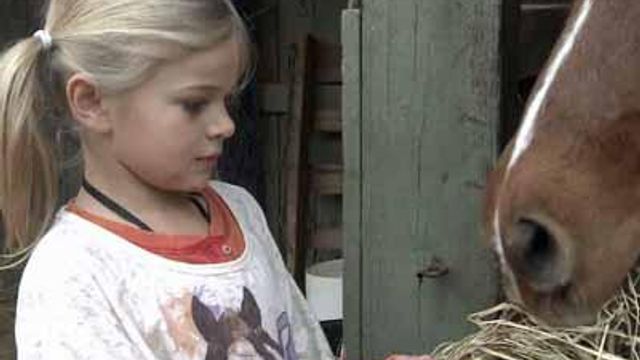Early detection, special hormone help child overcome rare blood disorder
Detection of rare diseases can be key in their treatment. For 7-year-old Liviya Anderson, the work of doctors at UNC helped her get treatment for a rare blood disorder. It saved her life.
Posted — UpdatedBlack beads represent shots. Heart-shaped beads show how many times Liviya has had to ride in an ambulance and "pokey" beads -- as Liviya calls them -- tell how many times she was scared. They are a stark reminder of how important the detection of rare diseases can be.
For Liviya, it was aplastic anemia, a rare blood condition characterized by bone marrow failure. It's the sort of rare diseasethat can be tough for doctors to detect, test for, diagnose and treat.
Luckily for Liviya, her doctors at the UNC Medical Center at the University of North Carolina at Chapel Hill were able to detect her condition in time for her to get treatment. It saved her life.
Rebecca Anderson, Liviya's mother, said she started having concerns when her daughter had unexplained bruises and a bad fever. Doctors ran several tests before figuring out what the issue was.
"They ran more blood tests and found not only were her platelets in critical levels, but so were her red and her white blood cells," Anderson said.
Once doctors realized it was aplastic anemia, which can be triggered by a virus that turned Liviya's immune system against her, Liviya began receiving blood transfusions. She went every two days for three months.
"She was living on transfusions from donors," Anderson said.
Doctors hoped to be able to perform a bone marrow transplant with Liviya's brother Jake, but he wasn't a suitable match.
That's when doctors decided to try Horse ATG, a hormone designed to help suppress Liviya's immune system.
So far, she's responded well and is doing fine, but she's not cured.
There's also still a chance that Liviya's condition could return within the next 10 years.
For now, though, her parents are thankful to have their daughter home and for the specialized care they received at UNC Medical Center.
"She would have never had treatment if it wasn't for me having access to blood and platelets," Liviya's father Brian said.
• Credits
Copyright 2024 by Capitol Broadcasting Company. All rights reserved. This material may not be published, broadcast, rewritten or redistributed.






